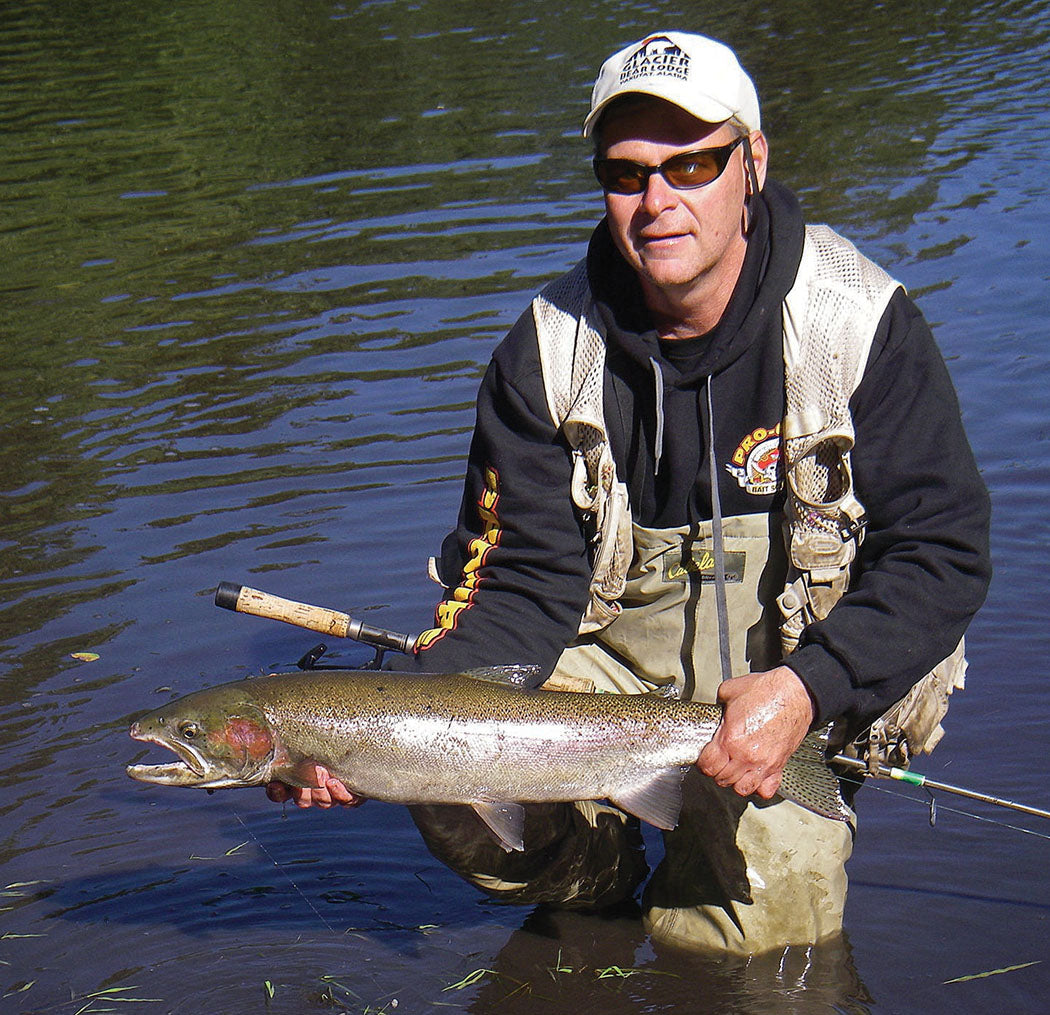If you have the opportunity to fish, then do it, even if the conditions aren’t exactly right. If the fishing isn’t going as hot and heavy as you would like, then maybe you can make your trip a learning experience.

The more you are willing to diversify, the more knowledgeable you become, which ultimately will make you a better fisherman.
I could sense the skepticism in his voice through my cellphone. “Don’t you think it’s been too hot for summer steelhead, Tony?” said one of my longtime fishing partners, who will remain nameless. But you know who you are!
“Yeah, I know dude.” I said without trying to sound desperate, “It’ll probably be a waste of time, but I’m just looking to get out. The commodity markets have been out of control for the last two weeks. When I go to sleep, I toss and turn all night dreaming about trading—I need a break!”
I don’t think my “buddy” was listen-ing to what I had to say, because without hesitation he said, “Hasn’t rained in over two weeks. It’ll be good after a rain. We’ll go then.” Then the conversation abruptly ended. Thanks a lot friend.
Without letting rejection get the better of me, I searched for my next victim. I called my other “go to guy,” Ricky Dunnett. The phone didn’t finish the second ring when I heard Ricky’s voice say, “I’m in.”
“How did you know?” I shot back. “I know you.”
“It might suck.”
What if it doesn’t?”
“Good point. See you at six?”
“My brother Randy might go.”
“Make it five thirty.”
It was about an hour after sunrise when the three of us arrived at the usually crowded parking lot, and we discovered that we would be the only fishermen on the river that morning. Randy, who doesn’t fish that much, surveyed the empty lot and said, “This can’t be good.” I tried to hide my concern, although from my experience I have found that empty parking lots usually indicate a lack of fish. The river was definitely low, but not as bad as I thought it would be. I had my mind made up that I was going to enjoy the day no matter if the fishing was good or bad. We floated about a half of a mile downstream until we reached the first deep hole below the put-in. I was the only one with a rod rigged, so I was the first to make a cast into the dark water.
My Apricot and Oregon Cheese colored yarn fly drifted only a few feet along the bottom when I felt a solid jolt, followed by a hard pull. Line simultaneously peeled from the reel, causing the line to cut into my right index finger. I immediately set the hook, and a mint bright steelhead torpedoed five feet into the air, violently shaking its head and causing the yarn to dislodge and come flying back toward me, hitting me in the leg. We were all stunned from the brief encounter, but I didn’t have much time to think about my lost fish because Randy proceeded to hook a steelhead on his first cast. The six-pound hen had no intention of staying in the river because it decided to make several consecutive leaps throughout the entire hole. The aerial display tired the steelie rather quickly, and a short while later Randy was unhooking his prize, while Ricky and I looked over his shoulder admiring the fish. Randy immediately released the fish as the three of us watched it slowly glide its way back toward the hole from which it came. For the next couple of hours, we took turns battling several more chrome steelhead from the same hole. The continuous, unforeseen action had us laughing like children and feeling like we had just pulled off the perfect crime.
That day turned out to be one of the most memorable days of my life. I have caught more steelhead on previous outings, and I definitely have caught bigger fish. Our largest fish that day may have only been ten pounds. What made that outing so remarkable was that we experienced phenomenal fishing that was totally unexpected, while never seeing another fisherman on the river that day. I’m sure that most of them decided to stay home and wait for more favorable conditions. We realized before we left that our trip might turn out to be a wild goose chase, but we still decided to try it. The weather had been unseasonably hot with very little rain, so we expected that the river would be low and clear as a result of the minor drought. The stream was on the low side, but for some reason there was still a fresh batch of rested steelhead waiting to be caught.
We live in a high-tech society which is advancing exponentially every year. It wasn’t very long ago when a steelheader would call local businesses in the vicinity of the river that he planned to fish prior to his trip seeking to obtain some sort of ac-curate weather report. If there was a recent rain, he would then have to try to predict how it might have affected the river. Nowadays, you can search the internet and find up to the minute stream flow graphs, different weather models, and local fishing reports. This new technology can be a blessing or it could be a curse depending on how one uses the information. I know several fishermen who are only looking to fish during dead-solid, perfect conditions, because they don’t want to risk “wasting” a day on the water. I understand that their time is valuable. They have responsibilities, family obligations, and other activities outside of fishing. However, I believe that you should find out first hand, or at least receive information from a reliable source who recently fished the river, rather than trying to decipher charts and reading the tea leaves. The only thing predictable about fishing is that it can be unpredictable, so the bottom line is that you should fish when you can and not wait for all of the conditions to perfectly line up before you consider leaving your driveway.
I’m not suggesting that someone should ignore the conveniences of modern technology. I think weather models are a fantastic tool to use, especially when they’re used for safety reasons. The information can be crucial when fishing big bodies of water, such as the Great Lakes. Knowing that there could be severe weather moving into an area or a significant change in the wind’s direction could potentially save your life. The same thing goes for checking the stream flow charts to see if a river is at safe level to fish. As far as fishing reports, I don’t like to read them because if the report says that the fishing is good, then my expectation will be high, which usually results in disappointment. Conversely, if the report is poor, then it might cause me to second guess my plans and keep me from going. I would much rather find out for myself if the fishing is lousy rather than not going and wondering what could have been.

Many of the larger rivers that host returns of salmonids also have excellent fishing for warm water species such as bass, walleye, and catfish.
If you have the opportunity to fish, then do it, even if the conditions aren’t exactly right. If the fishing isn’t going as hot and heavy as you would like, then maybe you can make your trip a learning experience. One of my objectives every time I go fishing is to try to discover something new on the water. I have always felt that when the fishing is good, you don’t learn as much as you would on days when the fishing is tough and you have to work hard to scratch out some action. It is mentally easier for you to do some exploring when you are not focused on catching fish. If I am experiencing slow fishing on a stream that’s running fairly clear, I might stop fishing for a while so that I can visually study Its bottom. I will try to figure out where I think the fish should hold and remember those spots for future trips. I will also try to understand why I have caught fish from certain spots in the past. I will make mental notes of these places, and I will return to those areas during more favorable conditions. Rivers change every season, so not all of the them will pan out, but some of them do. I enjoy the challenge of learning new rivers whenever I get the chance. When I fish somewhere for the first time, I will try to have the mindset that catching fish isn’t the main focus of the trip. I try to learn as much as I can, while I gather information to apply for future outings. Try to expand your horizons when your regular streams aren’t fishing well. Don’t be hesitant to change your routine. Other than your time, what do you have to lose?
Several years ago, my father and I were spending a few days in late October bank fishing the Big Manistee River near Welston, Michigan. It didn’t take us long to discover when talking to other fishermen that the fishing was poor. Unfortunately, the reports we received were that all of the fish were in the lower section of the river, areas that can only be reached from a boat, which we didn’t bring with us. We inquired about the other rivers in the area, but no one seemed to know anything.
The information about the Big M seemed to be accurate, because after two long days of bank fishing, neither one of us had hooked a fish on the river. We were dis-appointed with ourselves because we didn’t bother to call to inquire about the fishing before making the five-hour drive to fish a fishless river. Exasperated from banging our heads against the proverbial brick wall, we finally reviewed our options. We could either cut our trip short and head home, or we could get into the car and search for greener pastures. We decided to drive north and do some barnstorming.
We eventually found ourselves fishing below the Homestead Dam on the Betsie River. We inadvertently fell into the most outrageous, mind-blowing fishing that we had ever experienced. What happened to us can only be described as a Godsend. For the next day and a half, my dad and I caught as many chinooks, cohos, and the craziest steelhead that we could handle. We even caught a few lakers below the spillway. We heard later that the Betsie River got hit by a recent rainstorm that completely missed the Manistee system. That spike in the water level triggered the large push of fish to run the river. We were rewarded with phenomenal fishing, accidently discovered because my father and I took the initiative to go out and seek new opportunities instead of going home discouraged. who only fish rivers within his comfort zone. I know too many anglers who only want to fish specific places, even if that means having to suffering through poor fishing conditions. There will be times when a river won’t be fishing well. There is a chance that another river, possibly in close proximity, will be producing some fish. The more you are willing to diversify, the more knowledgeable you become, which ultimately will make you a better fisherman.
Remember, there are alternatives you can try when your target species are not plentiful or when the fish are unwilling to cooperate. A savvy fisherman will devise a solid back up plan when his original ideas fail. Don’t let your next outing turn out to be just a long car ride. Explore your options. For example, some steelhead streams also have excellent populations of resident trout which can be fun to catch by having the correct mindset and by using lighter equipment. Also, many of the larger rivers that host returns of salmonids also have excellent fishing for warm water species such as bass, walleye, and catfish.
Last July, my father and I took a shot at some steelhead fishing on the St. Joseph River during a very marginal time of the summer. We suspected that the fishing might not be very good for steelhead, so we planned ahead and brought our bass gear just in case. It didn’t take very long for us to figure out that there were not many steelhead in the system, and the ones that were in the river were stale and not interested in playing. We decided to call an audible by implementing plan B. We put away the steelhead rods and broke out the bass gear, which ended up salvaging our day. We hooked a fair amount of smallmouth that afternoon, nothing big, but still fun to catch. We even caught a couple of bonus catfish. Would I rather have gotten into a mess of steelhead? Of course, but catching any fish can be fun with a good attitude and the right equipment. We also learned a couple of things that we wouldn’t have if we just stuck to the steelheading.
Not every outing will turn out to be one for the ages. Believe me, when it comes to fishing, great days are rare, and poor to average days are much more common than a fisherman deserves. At least if you are out on the water, there is always a chance that something extraordinary can happen. There aren’t too many fish stories that start out by saying, “I was at home lying on the couch and….” That is what I love about fishing. It only takes one fish to turn a busted trip into one that you’ll remember for the rest of your life!






